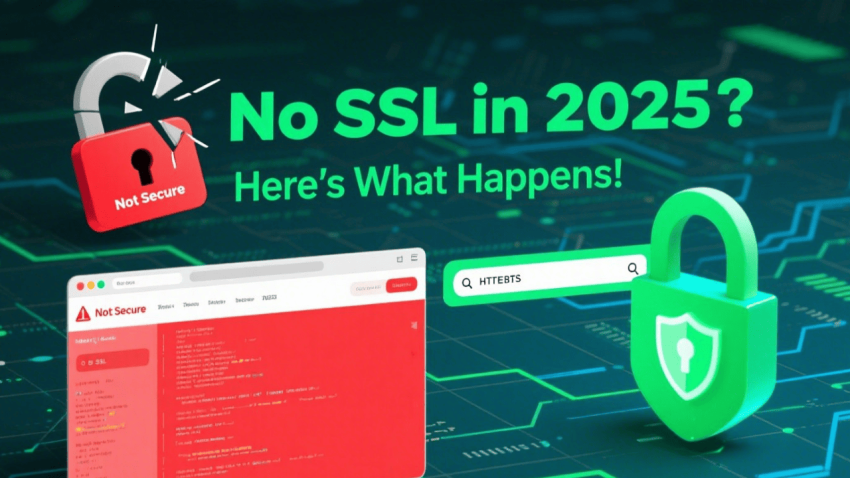Why Operating a Website Without SSL in 2025 Is a Major Security Threat
By 2025, running a website without SSL can expose it to serious cyber threats, especially as online security becomes more critical than ever. Regardless of using affordable hosting or a budget-friendly VPS, your website remains at risk if SSL encryption isn’t implemented. SSL certificates are crucial for safeguarding confidential user data, such as login details, payment information, and private interactions, from hackers and data breaches. Without this protection, your site becomes highly susceptible to attacks. Securing your website with a trusted SSL certificate not only improves security but also boosts user confidence and your site’s overall credibility.
What Makes a Website Without SSL a Major Security Weakness
In 2025, neglecting to install an SSL certificate is no longer a minor oversight, it’s a serious security vulnerability. While more people are becoming aware of online threats, many website owners still underestimate the importance of SSL encryption in protecting their digital platforms. Some may assume it’s only necessary for large or complex sites, but this mindset is dangerous. If your site processes payments, manages business functions, or gathers personal user data, SSL is absolutely essential. A website without SSL is far more likely to be targeted by cyberattacks, damaging user trust and compromising data security. In today’s digital world, SSL is not just a feature, it’s a fundamental requirement for safe and trustworthy website operations.
Why a Website Without SSL Is a Serious Risk in 2025
Still unsure whether your site needs SSL in 2025? Running a website without SSL exposes you to growing cybersecurity threats that can lead to data breaches, service disruptions, and a loss of user trust. It’s more than just a technical detail, ignoring SSL can damage your online credibility and weaken your brand’s reputation. In this section, we’ll explore why operating a website without SSL is no longer an option and what risks you’re taking by skipping this essential layer of protection.
-
Lack of Encryption Makes User Data Vulnerable to Attacks
In 2025, a website without SSL exposes sensitive user data to significant risk. Without proper encryption, personal information like login credentials or payment details can be easily intercepted by cybercriminals. This puts your users in harm’s way and undermines the trust they place in your platform. Securing your site with SSL is no longer optional, it’s a vital defense against data breaches and a key factor in preserving your site’s reputation.
-
Man-in-the-Middle Attacks Thrive on Websites Without SSL
Man-in-the-middle (MitM) attacks allow hackers to secretly intercept and manipulate the communication between your site and its visitors, potentially exposing login credentials, financial details, and personal information. Without the safeguard of SSL encryption, your site provides minimal resistance to these covert threats, placing both user data and your business at significant risk.
-
Website Without SSL Makes Phishing Attacks Easier
A website without SSL in 2025 is far more vulnerable to phishing scams. Without HTTPS and the recognizable padlock icon, users may find it difficult to distinguish between legitimate sites and malicious imitations. Cybercriminals often exploit this gap in security by designing fraudulent versions of websites to deceive users into revealing confidential data like passwords and financial information. Implementing SSL not only strengthens your site’s security but also builds credibility by assuring visitors of your site’s authenticity.
-
Legal Risk: Failing to Meet Data Protection Standards
Running a website without SSL in 2025 can expose your business to serious legal issues. Regulations like PCI DSS require SSL encryption for platforms that manage payment transactions or sensitive user information. Neglecting these obligations not only increases the likelihood of data breaches but also puts your business at risk of penalties, fines, and potential lawsuits. To stay compliant and preserve your business reputation, SSL implementation is no longer optional, it’s a necessity.
-
Loss of User Confidence and SEO Penalties
A website without SSL in 2025 doesn’t just face security threats, it also suffers in terms of credibility and online visibility. Popular browsers like Chrome now flag non-HTTPS sites as “Not Secure,” which can instantly drive visitors away. This warning erodes user trust and lowers engagement. Moreover, search engines tend to downrank unsecured websites, reducing their visibility in search results. Without SSL, your website risks losing both traffic and trust, two pillars of digital success.
Conclusions
In today’s digital landscape, running a website without SSL is no longer just a technical oversight, it’s a major threat to your security, credibility, and legal compliance. Fortunately, protecting your site has never been easier or more accessible. At SSL Singapore, we provide trusted, affordable, and globally recognized SSL certificates that work seamlessly across all devices and browsers. With features like fast domain validation, a 30-day money-back guarantee, and expert guidance to help you achieve an A+ SSL rating, securing your website is simple and stress-free. Still unsure? Take advantage of our free consultation to find the right SSL solution for your needs, because no business should risk going online without SSL in 2025. Contact us now!

